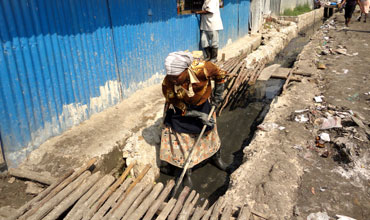Malaria control: Knowledge and Practice among Over-the-Counter Medicine Sellers in the Pru, Sene and Atebubu-Amantin Districts, Brong Ahafo Region, Ghana

Abstract:
Background:
Malaria continues to be a major health burden worldwide. In Ghana,
Over-the-Counter (OTC) medicine sellers and community pharmacies are known
private medicine outlets patients access for malaria treatment. The aim of this
study was to assess the knowledge and practice on malaria control among OTC
medicine sellers in the Pru, Sene West and East and Atebubu-Amantin districts
in the Brong Ahafo region of Ghana. Method: A cross-sectional
descriptive study was conducted using a structured questionnaire. Sixty-two
(62) OTC medicine sellers were randomly selected, informed consent sought and
interviewed on malaria transmission, symptoms, prevention, diagnosis and
treatment, antimalarial medicine stock and malaria training participated in. Data
entry, editing and analysis were done using SPSS. Results: The study
revealed a high knowledge on malaria transmission vector, symptoms and
prevention with 63% of the OTC medicine sellers have participated in at least
one malaria training organized either by the Pharmacy council and/or partners
within the past two years. Only 26.2% of OTC medicine sellers use the malaria
rapid diagnostic test (RDT) kit to diagnosis and confirm suspected malaria.
Majority (65.6%) of OTC medicine sellers often recommend Artemether
Lumefantrine (AL) to patients to treat uncomplicated malaria, with between 26%
to 43.5% of them haven herbal preparations, sulphadoxine pyrimethamine (SP),
monotherapies (only artesunate, or only amodiaquine or only artemether or only
lumefantrine) and quinine as the alternative antimalarial medicines at the
shop. Most OTC medicine sellers do not comply with the national antimalarial
drug treatment guidelines. There was a significant difference (p<0.05)
between the malaria management knowledge and skills of a trained OTC medicine
seller and a non trained one. Conclusion: Trained OTC medicine sellers
have better malaria management knowledge and skills than the non -trained ones.
Recommendation: Periodic malaria training of all OTC medicine sellers
which focuses on effective diagnosis and treatment would significantly improve
the knowledge and the skills in malaria management and control among OTC
medicine sellers at the community level.
Keywords: Malaria,
Knowledge, Practice, OTC medicine seller, Pru, Sene, Atebubu-Amantin
References:
[1.]
Addai-Mensah O,:
Establishment of a phage display platform for the isolation of Plasmodium
falcipurum, monoclonal antibodies, Research thesis, RWTH Aachen University:
page 1, October, 2014
[2.]
Affordable Medicine
Facility-malaria (AMFm) first-line buyers list, Global Fund, September, 2013.
[3.]
Ahorlu CK, Dunyo SK, Afari
EA, Koram KA, Nkrumah FK: Malaria-related beliefs and behaviour in southern
Ghana: implications for treatment, prevention and control. Trop Med Int Health
2: 488–499,1997
[4.]
Buabeng K.O, The Role of
the Pharmaceutical Sector in malaria Control in Ghana, Faculty of Health
Science, University of Eastern Finland 2010
[5.]
Cohen JC, Gyansa-Lutterodt
M, Torpey K, Esmail LC, Kurokawa G: TRIPS, the Doha Declaration and increasing
access to medicines: policy options for Ghana. Global Health 1: 17, 2005
[6.]
Danquah D.A , Evaluating
Access to Anti-Malaria medicine and quality of Service delivery by Community
Pharmacies and Licensed Chemical Shops in Ashanti Region, Ghana 2010
[7.]
FHI 360, OTC medicine sellers identification and
selection exercise, Pru, Sene and Atebubu-Amantin districts, 2015, Ghana
[8.]
Gallup, JL; Sachs, JD. The
economic burden of malaria. Am J Trop Med Hyg. 2001;64:85–96. [PubMed]
[9.]
Ghana district map -www.ghanadistricts.com/home) accessed on May 5th,
2015
[10.] Global Fund AMFm pricing , August 2010 report
[11.] Goodman C, Brieger W, Unwin A, Mills A, Meek S, Greer G:
Medicine sellers and malaria treatment in sub-Saharan Africa: what do they do
and how can their practice be improved? Am J Trop Med Hyg 77 (Suppl 6):
203–218, 2007a
[12.] Health Partners Ghana. Management of malaria by care
givers and licensed chemical sellers in the Ashanti Region, Ghana. A baseline
survey of the MAM Project October, 2008.
[13.] Ministry of Health (GNDP) Ghana: Ghana national drug
policy, second edition 2004. Accessed May 4th 2015 from
http://who.int/countries/gha/publications/Ghana_National_DrugPolicy_2nd_Edition.pdf
[14.] Pharmacy Council, Ghana: Practice standards for
pharmacist and licensed chemical sellers, 2004.
[15.] Republic of Ghana (Pharmacy ACT 489): Pharmacy Council
ACT, 1994
[16.] WHO The Roll Back Malaria strategy for improving access
to treatment through home management of malaria. World Health Organization.
2005.
[17.] World Health Organization: Guidelines for Treatment of
Malaria, 2015
[18.] World Health Organization: World Malaria Report 2015.

